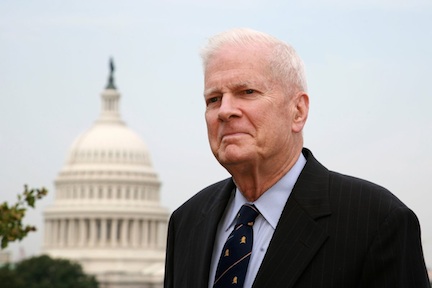
“I have been going to Russia for forty years, trying to understand the biggest land mass in the world and the psychology of a people with the most wonderful Utopian aspirations despite an experience of human suffering that few other peoples have known …”
– James H. Billington
By Karys Blakemore
James H. Billington (ΦBK, University of Chicago, 1954), an exemplary historian and scholar, is the 13th and current Librarian of Congress. Since his entrance to the position in 1987, Billington has helped to significantly develop the Library’s network of resources; he created an advisory group, entitled the James Madison Council, to support the Library’s exhibitions and to help acquire new materials and collections. Furthermore, in 2005 Billington proposed that UNESCO create a World Digital Library. This library, which was officially launched in 2009, contains materials from 193 different nations with commentary in seven different languages, thus providing people worldwide with access to an enormous collection of diverse literature.
Billington’s work before he became Librarian of Congress was largely centered around education and scholarship. After earning his doctorate from Oxford University in 1953, he went on to teach history at both Harvard and Princeton universities. From 1973 to 1987, Billington directed the Woodrow Wilson International Center for Scholars and created a multitude of new programs to support research and fellowship.
These achievements as a librarian, administrator, and professor have made Billington a distinguished public figure. However, those who study the Russian language and culture may be familiar with Billington for a different reason; he is a respected authority on all things Russian who has promoted Russian studies in the United States for the past forty years.
Billington’s passion for Russian culture has been the driving force behind his work as Russian advocate and historian. His contributions to the field of Russian studies, which include a number of books and a video series, are momentous because they help to shed light on a culture that is so often misunderstood and misconstrued in the west. During his time as the Director of the Woodrow Wilson International Center, for example, Billington founded the Kennan Institute for Advanced Russian Studies. This institute expressly serves to improve “American expertise and knowledge about Russia, Ukraine, and other states in the region.”
Billington is also responsible for a multitude of books that explore Russian history. In 1970, for example, Billington wrote the well-known book The Icon and the Axe (1966). According to Michael David-Fox, an associate professor at Georgetown University, this book is a, ” … classic that profoundly influenced the development of Russian cultural history.” Billington’s other books include Mikhailovsky and Russian Populism (1956), Fire in the Minds of Men (1980), and Russia Transformed: Breakthrough to Hope, August 1991 (1992). While these books explore different themes—such as political change, orthodoxy, and social order—they all contribute in significant ways to our understanding of Russian culture.
In 1998, PBS released a video series that was written and narrated by Billington himself. This series, The Face of Russia, explores Russia’s cultural history by examining specific literary works, pieces of art and musical compositions. In fact, the series is so eloquent, informative, and historically accurate that it is still used today by Russian professors to help students better understand Russian culture.
When asked about the origin of his love for Russia, Billington began with this simple, profound and somewhat ironic statement: “Well, I fell in love with Russian culture by reading War and Peace as a schoolboy, during World War II.” Regardless of how this love formed, Billington deserves the gratitude of all Russian enthusiasts and scholars for dedicating himself to the advancement of Russian studies because there are few people in the United States who have done more to promote Russian culture.
Karys Blakemore is currently a senior at George Mason University majoring in Russian and Eurasian Studies and Spanish as a foreign language. She became a member of Phi Beta Kappa in her junior year. George Mason is home to the Omicron of Virginia Chapter of Phi Beta Kappa.




